

AlphaLISA Human PCSK9 Detection Kit, 500 Assay Points
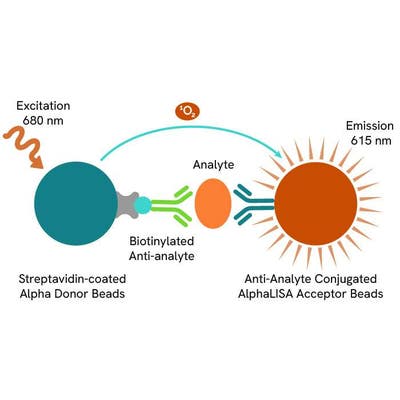
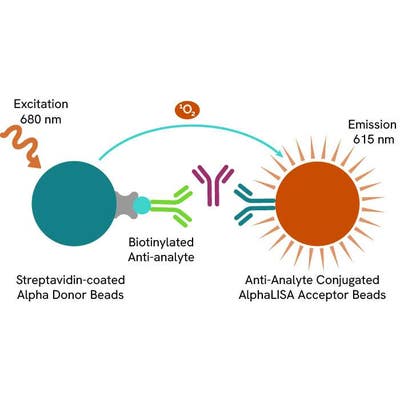
 View All
View All
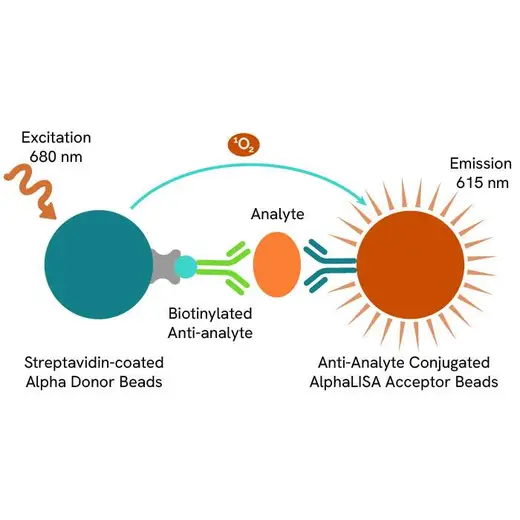
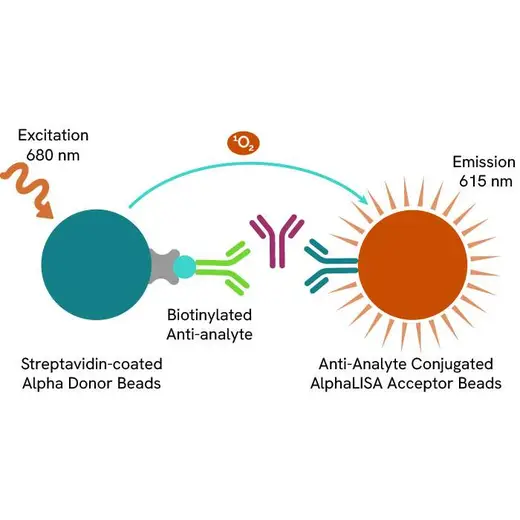



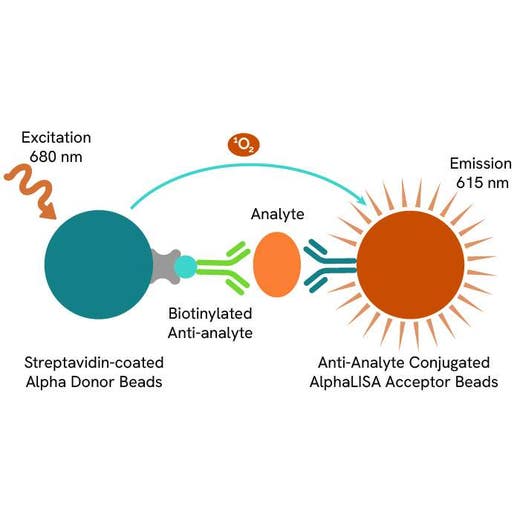
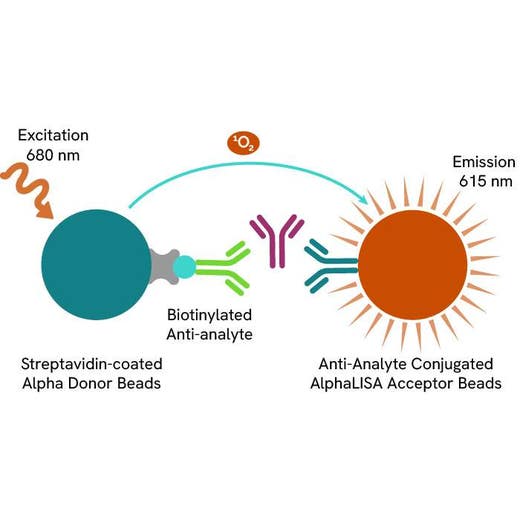



| Feature | Specification |
|---|---|
| Application | Protein Quantification |
| Dynamic Range | 1,056 - 300,000 pg/mL |
| Limit of Detection | 1,056 pg/mL |
| Sample Volume | 5 µL |















Product information
Overview
Formats:
- Our 500 assay point kit allows you to run 500 wells in 96-well or 384-well format, using a 50 µL reaction volume (5 µL of sample).
- Our 5,000 assay point kit allows you to run 5,000 wells in 96-well or 384-well format, using a 50 µL reaction volume (5 µL of sample).
Features:
- No-wash steps, no separation steps
- ELISA alternative technology
- Sensitive detection
- Broad sample compatibility
- Small sample volume
- Results in less than 3 hours
- Half the time of an ELISA assay
Human Proprotein Convertase Subtilisin / Kexin Type 9 (PCSK9) belongs to the proteinase K subfamily of the secretory subtilase family. This glycoprotein contains 692 amino acids, including a signal peptide, a prodomain, and a catalytic domain. Initially synthesized as a soluble 74 kDa precursor protein, it is cleaved into 14 kDa and 60 kDa domains, which remain associated. This protein plays a major regulatory role in cholesterol homeostasis and is highly expressed in the kidney, liver, and intestine. PCSK9 binds to the low-density lipoprotein receptor (LDLR), inducing LDLR degradation. Reduced LDLR levels result in decreased metabolism of low-density lipoprotein, which could lead to hypercholesterolemia. Inhibition of PCSK9 function is currently being explored as a means of lowering cholesterol levels. Mutations in this gene have been associated with a rare form of autosomal dominant familial hypercholesterolemia.
AlphaLISA technology allows the detection of molecules of interest in a no-wash, highly sensitive, quantitative assay. In an AlphaLISA assay, a biotinylated anti-analyte antibody binds to the Streptavidin-coated Donor beads while another anti-analyte antibody is conjugated to AlphaLISA Acceptor beads. In the presence of the analyte, the beads come into close proximity. The excitation of the Donor beads causes the release of singlet oxygen molecules that triggers a cascade of energy transfer in the Acceptor beads, resulting in a sharp peak of light emission at 615 nm.
How it works
Principle of the AlphaLISA assay
The AlphaLISA assay is based on an AlphaLISA sandwich immunoassay involving a biotinylated anti-analyte antibody bound to Streptavidin-coated AlphaLISA Donor beads and an anti-analyte antibody conjugated to AlphaLISA Acceptor beads. Both antibodies are directed against the analyte of interest. In the presence of the target, both antibodies bind to analyte and the beads come into proximity. The excitation of the Donor beads provokes the release of singlet oxygen molecules that triggers a cascade of energy transfer within the Acceptor beads, resulting in emission with λmax at 615 nm. The intensity of the signal is directly proportional to the concentration of analyte present in the sample.

Protocol of the AlphaLISA assay
The AlphaLISA assay can be run in a 96- or 384-well detection plate (50 µL final). As described here, samples or standards are dispensed directly into the assay plate for the detection of the analyte of interest by AlphaLISA reagents. No washing steps are needed. The protocol can be further miniaturized or upscaled by simply resizing each addition volume proportionally.
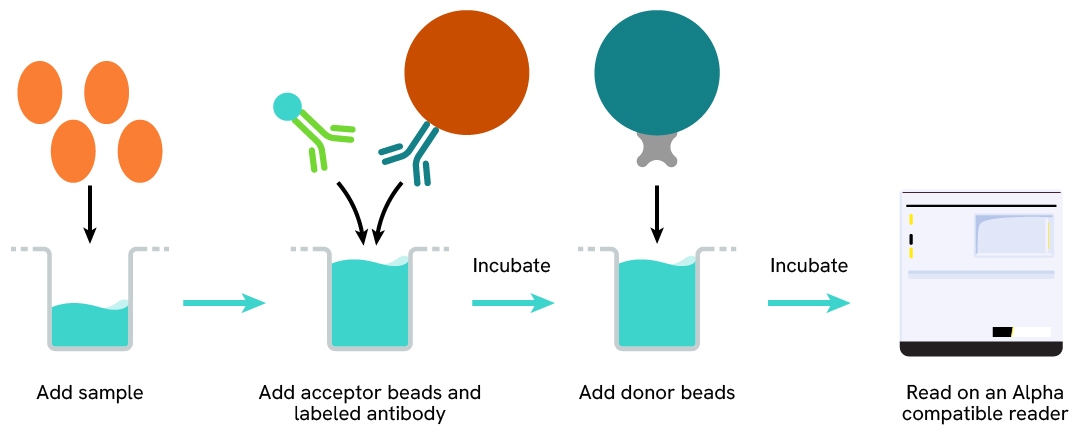
Specifications
| Application |
Protein Quantification
|
|---|---|
| Automation Compatible |
Yes
|
| Brand |
AlphaLISA
|
| Detection Modality |
Alpha
|
| Dynamic Range |
1,056 - 300,000 pg/mL
|
| Limit of Detection |
1,056 pg/mL
|
| Product Group |
Kit
|
| Sample Volume |
5 µL
|
| Shipping Conditions |
Shipped in Blue Ice
|
| Target |
PCSK9
|
| Target Class |
Biomarkers
|
| Target Species |
Human
|
| Technology |
Alpha
|
| Therapeutic Area |
Cardiovascular
|
| Unit Size |
500 assay points
|
Video gallery
Resources
Are you looking for resources, click on the resource type to explore further.
Atherosclerosis pathogenesis, cellular actors, and pathways
Atherosclerosis is a common condition in which arteries harden and...


Loading...
How can we help you?
We are here to answer your questions.






























